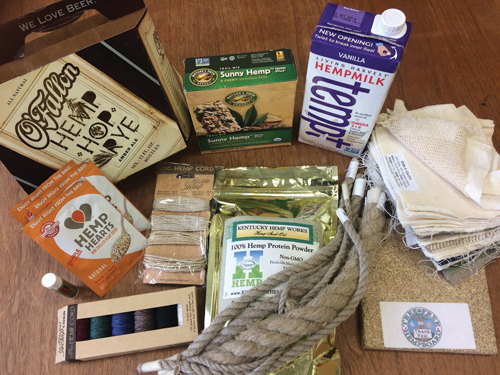
The movement to allow hemp farming in Illinois continues in 2018.
Illinois was once a leader in the production of industrial hemp, and today, advocates in Springfield are working to allow Illinois farmers to grow this useful and environmentally friendly crop once again. Despite passing the state Senate unanimously in 2017, the bill stalled in the House last spring.
This January, Sen. Toi Hutchinson of Chicago Heights reintroduced a bill that would allow farmers to grow industrial hemp with a license from the Illinois Department of Agriculture (IDOA), as authorized under the 2014 federal Farm Bill. Final language for the Industrial Hemp Bill (SB2298) is expected to be introduced as an amendment in the coming weeks, and the issue has garnered strong support on both sides of the aisle.
Advocating for Hemp Products
The Illinois Stewardship Alliance and Illinois Farmers Union took the lead advocating for hemp because we heard from numerous farmers who want to grow it. Opposition to the bill last year came from parts of the medical cannabis industry, who expressed concern over impact to their businesses. The two plants are related, but hemp is, by definition, not a psychoactive drug, and the federal government has carved out legal protection for the production of hemp, unlike psychoactive cannabis. There are substantial differences between the plants in both botanical composition and federal legal status, so the two issues should not be blurred together.
 Ryan Butzow, who farms east of Peoria in Onarga, told us hemp would help diversify his crop rotation. “As a farmer, I see tremendous potential for growing industrial hemp in Illinois,” he says. “Its vigorous growth and tall canopy would compete well with weeds.” Environmental groups in Illinois support hemp for its promise to remediate contaminated soils, help farmers transition to organic, and potentially outcompete aggressive herbicide-resistant weeds. This could keep more chemicals out of our soil and water.
Ryan Butzow, who farms east of Peoria in Onarga, told us hemp would help diversify his crop rotation. “As a farmer, I see tremendous potential for growing industrial hemp in Illinois,” he says. “Its vigorous growth and tall canopy would compete well with weeds.” Environmental groups in Illinois support hemp for its promise to remediate contaminated soils, help farmers transition to organic, and potentially outcompete aggressive herbicide-resistant weeds. This could keep more chemicals out of our soil and water.
In addition to crop diversification and the environmental benefits, hemp could also be a job creator. With more supply, there is potential for new hemp processing industries to bring well-paid jobs to the state. At least 25,000 different products can be made from hemp, from plastic alternatives to “hempcrete” and particle board, food, cosmetics, rope, clothing, botanical extracts and much more, according to North Dakota State University research.
Salvador Jasso, a clothing designer in west suburban Glendale Heights, is excited for the opportunity to source hemp locally rather than importing from China. “I have created a hemp clothing line to bring opportunities back home to the people who founded Illinois, our farmers,” he notes. “I want to revitalize our soil, our foundation, and to rebuild our communities for a sustainable future.”
Butzow says farmers like him are missing out an opportunity that farmers in neighboring states enjoy. “The growing market for hemp products in the U.S. is largely dependent on imports and that's a missed opportunity for Illinois farmers.” Neighboring Kentucky enrolled over 135 farms and 40 processors in its state hemp program in 2016, and it is already possible to purchase hemp products grown and processed there. Wisconsin passed a hemp law in December of 2017, joining more than 30 other states.
Research and the Bottom Line
In the 1940s, Illinois was a leading producer of hemp, and the federal government even selected the northern Illinois town of Polo as the site for a hemp processing pilot program. Chad Wallace of Oak Tree Farms in Ashland, Illinois, has roots in growing hemp. “A lot of people, including my grandparents, used to grow hemp back in the day. We still have it coming up wild on my farm sometimes.”
Wallace is interested in the possibility of using hemp to help naturally transition some farmland to organic production in the future, while still earning income for a cash crop. Hemp could provide needed income as farmers make the multi-year transition to becoming certified organic.
While Illinois passed an industrial hemp bill in 2014 in response to the Farm Bill, that legislation only allowed state universities offering four-year agricultural sciences degrees to become licensed—not farmers. No applications were even filed until recently, and farmers are still left out of the program.
In the meantime, the DEA, FDA and USDA issued a statement clarifying that state departments of agriculture could license farmers to participate in industrial hemp research programs if state law allows. A permissible research purpose under the Farm Bill is marketing, which allows hemp to be produced and sold.
Illinois Stewardship Alliance and Illinois Farmers Union members hope this is the year state leaders will give farmers the freedom to grow hemp. “This legislation gives Illinois farmers the freedom to try growing a crop that’s good for their bottom line and can keep our waterways cleaner,” explains Liz Moran Stelk, executive director of the Illinois Stewardship Alliance.
“In all the research I've done,” Butzow adds, “I see no downside to allowing farmers to grow hemp, and I sincerely hope we have the opportunity to do it sooner than later." iBi

